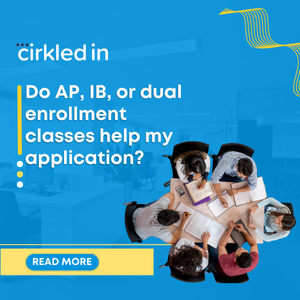Do AP, IB, or Dual Enrollment Classes Help My College Application? (Short Answer: Yes, But Let’s Break It Down)

Are AP (Advanced Placement), IB (International Baccalaureate), or dual enrollment classes actually worth it for college applications? Do they really help, or are they just another thing to stress over? If you’re trying to figure out how these courses impact your chances of getting into college, let’s break it down so you can make the best decision for your future and you know what’s worth your time (and late-night study sessions).

1. Do AP, IB, and Dual Enrollment Help College Applications?
Short answer: Yes! Colleges love to see students challenging themselves. Taking rigorous courses shows you’re prepared for college-level academics. But that doesn’t mean you need to overload your schedule.
✅ A few advanced courses with solid grades > Taking too many and struggling
📌 Pro tip: Colleges value quality over quantity—it’s better to succeed in a few tough classes than barely pass a full schedule of them.
2. AP vs. IB vs. Dual Enrollment—Which One is Right for You?
Not all advanced courses are the same. Here’s a quick breakdown:
- AP (Advanced Placement): College-level courses ending with an exam. Score a 3+, and you might earn college credit.
- IB (International Baccalaureate): A globally recognized, structured program with essays, projects, and exams. The IB Diploma Program (IBDP) is highly respected but challenging.
- Dual Enrollment: You take real college classes (usually at a community college) while in high school. These could count as actual college credits.
🤔 Pro tip: Pick what fits your learning style. Love standardized tests? AP. Prefer research-based learning? IB. Want actual college experience? Dual enrollment.
3. Bonus: Earn College Credit & Save Money 💰
One major perk of these programs? They can save you thousands on college tuition.
- Many colleges accept AP exam scores of 3+ for credit, letting you skip intro classes.
- Some universities grant advanced standing to IB Diploma students.
- Dual enrollment credits may transfer as real college credits—but check with your future school first!
📌 Pro tip: Look up your dream school’s AP, IB, and dual enrollment credit policies before assuming your credits will transfer. Every college is different!
4. Even Without Credit, They Boost Your College Application
Even if your AP, IB, or dual enrollment credits don’t transfer, they still help your college application stand out.
📈 Pro tip: If your grades improved over time, highlight that in your application! Colleges love to see academic growth.
5. Do You Need These Courses to Get Into a Good College?
Nope! You can still get into great schools without them. But if your high school offers AP, IB, or dual enrollment and you don’t take any, it might look like you avoided a challenge.
⚖️ Pro tip: Take rigorous courses in subjects you enjoy and that align with your future major or career goals.
Final Thoughts
AP, IB, and dual enrollment classes can boost your college applications, show your academic dedication, and even save you money. But they’re not the only way to stand out. Choose wisely, challenge yourself where it makes sense, and don’t forget—your mental health matters too. ✨
Get More College Admissions Tips:
Check out Cirkled In Library for expert advice and tools to help you build a winning college application and land a spot at your dream school!
Looking for more ways to stand out on your college applications? Join Cirkled In today! 🚀



0 Comments